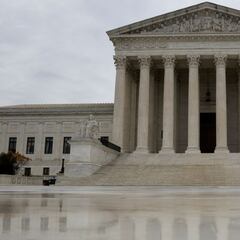What is the difference between an abortion pill and Plan B?
A group of pro-choice protestors hit the headlines after appearing to take abortion pills at the Supreme Court, but what is a medical abortion and when is it used?


This week the Supreme Court heard oral arguments on a case that has the potential to overturn Roe v Wade, the 1973 legal precedent which first secured abortion rights in the United States.
As such the issue of abortion rights has been front and central in national consciousness in recent weeks and hundreds of pro-choice advocates gathered outside the Supreme Court on Wednesday. One group appeared to take an abortion pill called Mifepristone under a banner which read: ‘We are taking abortion pills forever’.
Epic action from @ShoutYrAbortion — people took abortion pills outside the Supreme Court! pic.twitter.com/kKditao6Xd
— Erin Matson (@erintothemax) December 1, 2021
Abortion pills are not the same as a Plan B. The Plan B pill does not cause abortion or miscarriage, and is instead used to prevent a pregnancy happening in the hours and days immediately after intercourse.
Alternatively, abortion pills are used to terminate a pregnancy that has already happened but within the first trimester. They offer a medical alternative to abortion procedures and are generally used only within the first ten weeks of pregnancy.
How do abortion pills work?
Abortion pills are administered in a two-step process for patients who have confirmed pregnancies. An ultrasound scan is required to give the medical professional real-time information about the fetus and the state of the pregnancy.
If it is established that a medical abortion is feasible, a Mifepristone pill is administered to block the hormone progesterone and prevent the fetus from remaining implanted in the uterus lining. A second pill, Misoprostol, is then taken 24-48 hours after the first to expel the fetus from the body.
Read more
- What to know about the Mississippi abortion law before the Supreme Court
- When will the Supreme Court rule on abortion verdict?
- The history of Roe v Wade
What is a Plan B pill?
The Plan B option is colloquially termed ‘the morning-after pill’ or ‘the day-after pill’ and is used to prevent conception after having unprotected sex. However this only works if the fertilized egg has not yet attached to the uterus, meaning that there is a fairly small window during which the Plan B pill s effective.
Related stories

What is Roe v Wade in law? What happened in 1973?
Typically, manufacturers recommend taking the pill no more than 72 hours after intercourse and warn that there can be side effects if taken alongside other forms of medication. Estimates from Healthline suggest that the Plan B pill is 75-95% effective, while abortion pills are 98-99% effective in ending a pregnancy.
For more information on the differences between abortion pills and the Plan B, support group Women’s Center has a helpful guide on both options as well as lots of other useful advice and information.
